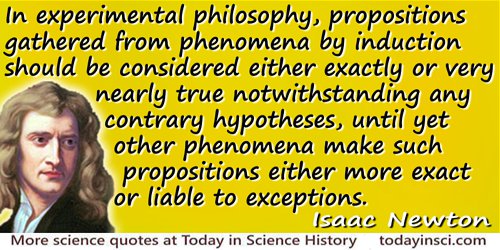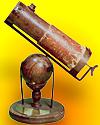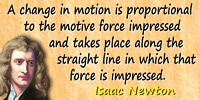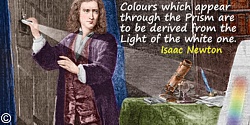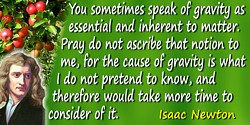 (source)
(source)
|
Sir Isaac Newton
(25 Dec 1642 - 20 Mar 1727)
English physicist and mathematician who made seminal discoveries in several areas of science, and was the leading scientist of his era.
|
Isaac Newton
“In experimental philosophy”
Illustrated Quote - Medium (500 x 250 px)
More Isaac Newton quotes on science >>
Newton’s revisions newly included three Rules of Reasoning in the second (1713) edition of his Principia. In the third edition (1726), a fourth was added. As summarized by David B. Wilson, “Newton’s four rules of reasoning proceeded … from nature’s simplicity, to its uniformity, to its universality with inductive propositions being modified by contrary phenomena, not contrary hypotheses.”1
The 4th Rule is perhaps the most important of these Rules. Newton wrote his original in Latin. The English version shown above, is as newly translated by I. Bernard Cohen and Anne Whitman (1999).
The theory that best fits the data can be regarded as true, until proven otherwise.
Newton wants observable data to drive what becomes accepted wisdom, not the chatter of philosophers. Newton insists, that what is understood from data provided by observation can be provisionally accepted as the next starting point. Subsequent data from investigation may be used to support and refine that understanding. However, this further data may require revising the original understanding.
Evidence from tests are only sometimes decisive, by giving a clear indication of what is true or what is false. When a results exists, but other evidence appears to conflict, one conclusion may appear to be more likely to be true. Despite the uncertainty, that can still be used as the starting point for more investigation to resolve the conflict.
Newton was describing what we now know as the scientific method. The theory must fit the facts, never attempting to favour facts to fit the theory.
As Newton adds as an explanation after Rule 4:
“This rule should be followed, so that arguments based on induction may not be nullified by hypotheses.”
Experiment takes priority over speculation.
In the original Latin, Rule 4 and the explanatory line are:
In philosophia experimentali, propositiones ex phænomenis per inductionem colledæ, non obstantibus contrariis hypothesibus, pro veris aut accurate aut quamproxime haberi debent, donec alia occurrerint phænomena, per quæ aut accuratiores reddantur aut exceptionibus obnoxiæ.
Hoc fieri debet ne argumentum inductionis tollatur per hypotheses.”
Referring to Newton's original manuscript, there is a crossed-out section which expanded on the above:
“If arguments based on hypotheses were to be admitted against inductions, then inductive arguments, on which the whole of experimental philosophy is based, could always be overturned by contrary hypotheses”2
Newton further amplified the meaning of this Rule 4 in his book The Opticks:
“And although the arguing from Experiments and Observations by Induction be no Demonstration of general Conclusions; yet it is the best way of arguing which the Nature of Things admits of, and may be looked upon as so much stronger, by how much the Induction is more general. And if no Exception occur from Phenomena, the Conclusion may be pronounced generally. But if at any time afterwards any Exception shall occur from Experiments, it may then begin to be pronounced with such Exceptions as occur.”3
Hence “Newton was approaching the empirical world in a sequence of approximations.”4
2 Steffen Ducheyne, The Main Business of Natural Philosophy: Isaac Newton’s Natural-Philosophical Methodology (2011), 118.
3 Isaac Newton, Opticks: Or, A Treatise of the Reflections, Refractions, Inflections and Colours of Light (1704, 1718), 380.
4 Ducheyne, 119.
- Science Quotes by Sir Isaac Newton.
- 25 Dec - short biography, births, deaths and events on date of Newton's birth.
- Isaac Newton - biography from Famous Men of Science (1889)
- Isaac Newton - Comments on his “Playing on the Seashore” Quote
- Isaac Newton - “Playing on the Seashore” illustrated quote - Medium 500px.
- Isaac Newton - “Playing on the Seashore” illustrated quote - Large 800px.
- Isaac Newton - context of quote “A change in motion” - Medium image (500 x 250 px)
- Isaac Newton - context of quote “A change in motion” - Large image (800 x 400 px)
- Isaac Newton - context of quote “In experimental philosophy” - Large image (800 x 400 px)
- Isaac Newton - context of quote “Standing on the shoulders of giants” - Medium image (500 x 250 px)
- Isaac Newton - context of quote “Standing on the shoulders of giants” - Large image (800 x 400 px)
- Isaac Newton - context of quote “Impressed force is the action” - Medium image (500 x 250 px)
- Isaac Newton - context of quote “Impressed force is the action” - Large image (800 x 400 px)
- Isaac Newton - context of quote “Inherent force of matter is the power of resisting…” - Medium image (500 x 250 px)
- Isaac Newton - context of quote “Inherent force of matter is the power of resisting…” - Large image (800 x 400 px)
- Isaac Newton - context of quote “Plato is my friend” - Medium image (500 x 250 px)
- Isaac Newton - context of quote “Plato is my friend” - Large image (800 x 400 px)
- Isaac Newton - context of quote “Colours which appear through the Prism ” - Medium image (500 x 250 px)
- Isaac Newton - context of quote “Colours which appear through the Prism ” - Large image (800 x 400 px)
- Isaac Newton - context of quote “Nature does nothing in vain” - Medium image (500 x 250 px)
- Isaac Newton - context of quote “Nature does nothing in vain” - Large image (800 x 400 px)
- Isaac Newton - context of quote “No more causes of natural things should be admitted” - Medium image (500 x 250 px)
- Isaac Newton - context of quote “No more causes of natural things should be admitted” - Large image (800 x 400 px)
- Isaac Newton - context of quote “Truth is ever to be found in simplicity” - Medium image (500 x 250 px)
- Isaac Newton - context of quote “Truth is ever to be found in simplicity” - Large image (800 x 400 px)
- Isaac Newton - context of quote “Every body perseveres in its state of being at rest” - Medium image (500 x 250 px)
- Isaac Newton - context of quote “Every body perseveres in its state of being at rest” - Large image (800 x 400 px)
- Isaac Newton - context of quote “God, in the beginning, formed matter” - Medium image (500 x 250 px)
- Isaac Newton - context of quote “God, in the beginning, formed matter” - Large image (800 x 400 px)
- Isaac Newton - context of quote “The cause of gravity is what I do not pretend to know” - Medium image (500 x 250 px)
- Isaac Newton - context of quote “The cause of gravity is what I do not pretend to know” - Large image (800 x 400 px)
- Sir Isaac Newton’s Apple-Tree - debunking the myth, from Historic Ninepins: A Book of Curiosities by John Timbs (1869)
- Newton and the Dog - debunking the myth about Newton’s dog Diamond.
- Booklist for Isaac Newton.
